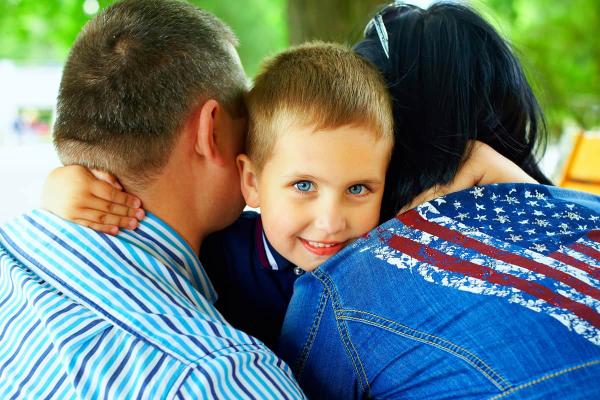
As adoptive parents, we often imagine the discussion about our child's beginnings. We wonder how we will successfully tell him about his history in a way that conveys love and truth. Talking with your child about adoption can begin as early as possible, if this means shortly after birth, or her transition to your home. A child's history is her own, our job is to provide her all the information we have in a developmentally appropriate way.
There are many factors to consider when discussing adoption with your child, if you don't know much about his birth parents or circumstances of early life, if rape or incest plays a role, if adopted internationally and cultural beliefs and attitudes impact the decision to place a child for adoption. This is difficult territory to navigate, your tone can often convey as much as your words. Parents often worry when they have very little information about a child's early beginnings. You can share this with your child as he ages by saying "I wonder if it ever makes you mad/sad that we don't know more about your birth parents."� Regardless of your child's feelings about her adoption, you can be supportive, and validating as she makes sense of her story.
Perhaps one of the most important factors to keep in mind when discussing adoption is your child's current developmental stage. Your discussions about adoption will evolve throughout her life. Your child will focus on different aspects of adoption depending upon his age. We will begin by exploring these discussions with preschoolers and early elementary.
Preschoolers
Consider this time period as laying the foundation for future adoption discussions. All children love to hear the story about how their family was formed. Convey that you are comfortable talking about adoption and that it is a topic always available for discussion. If you aren't comfortable talking about adoption, attempt to work through some of this with family members or a therapist. Your attitude and comfort with the topic will subtly impact how your child receives the information. At this age, a child may recite back his adoption story, but it's little more than repeating information he's heard, the understanding will come later. There are many adoption related children's books that can serve as a good way to introduce the concept of adoption.
Begin with differentiating that your child grew in her birth mother's tummy. You may say "Daddy and I wanted a baby very much, but we couldn't make a baby. You grew in your birth mother's tummy and we adopted you."� Be sure to include that she was born the same way all children are born. We often say things like "We couldn't have a baby, so we contacted an adoption agency to adopt a child,"� by leaving out the part where your child is born may complicate what adoption actually means. If your child was adopted after birth you might say, "You lived with your birth parents until you were 2, they were having trouble taking care of you, because babies need love, attention, food and a safe place to live. So, you came to live with us and we adopted you."� Provide an overview of the story with the understanding that you will fill in the details as the child's comprehension grows. Follow her lead, you may find that her questions are very basic and literal, this is due to the way she grasps the world at this point.
Early Elementary Years (5-9)
At this stage, your child may begin to be more curious about the specifics of his adoption. He may ask "What did my birth mom look like?"� "Why didn't I stay with that family?"� He has heard the story about what led to his adoption, but now he is starting to grasp the concept of "why?"� Providing concrete details to your child will help to make this abstract concept and idea of "birth parents"� become more real. If you have pictures, show them to your child. If you know anything about birth parents' hobbies or interests, share this with your child. If you know very little about birthparents or the circumstances surrounding the adoption, attempt to explain to your child the cultural and economic circumstances of the country she was born (if it's an international adoption.) Your child will begin to understand this, but really it's a building block for later cognitive development.
Most importantly, acknowledge and empathize with your child. Statements such as "I would have these questions, too, if I were you. We will talk about it as much as you want."� Or, "It's OK to think about and miss your birth mom."� Encouraging your child to work through these questions is healthy. The questions at this age show that he is beginning to do some reflecting on his life experience with adoption - this is just what you want. If your child isn't asking these questions, try an opener such as "I was thinking about your birth parents today"� and see where it goes.
You know your child best. Trust your instincts when it comes to these conversations. Your love and acceptance for your child will come through. The day to day interactions you have with your child will communicate that he is "wanted."� As adoptive parents, we may worry that children will feel eternally defective or abandoned. Addressing this through conversations with our child about her adoption history is one way to address this. But, keep in mind, you are already doing this every day through your actions, unconditional love and support for her.

